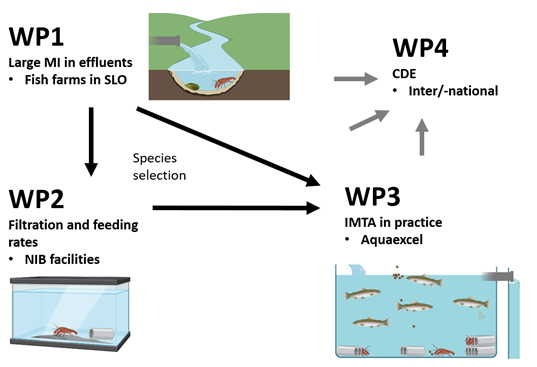Projects
The purpose of the investment project BTH-NIB is the assurance of the appropriate infrastructural conditions for the use of research and developmental opportunities in the fields of operation of the NIB.
Play Video About project Publication
PURIFICATION – Pollution reduction by diversification of freshwater aquaculture
Project coordinator: Žiga Ogorelec, PhD
Code: Z1-60167
Duration: 1.1.2025 – 31.12.2026
Aquaculture is among the fastest-growing food sectors, replacing the role of already overexploited wild fisheries in providing sufficient amounts of seafood. It is considered one of the most sustainable meat production systems, as it for the same amount of product requires less feed and land than the farming of poultry, pork or cattle. The current EU situation of importing around 80% of all seafood is not a sustainable practice. Within the frame of the European Green Deal and the Recovery Plan for Europe, a Sustainable blue economy plays a fundamental role with ambitious plans for competitive, responsible and climate-neutral European aquaculture with additional focus on preserving freshwater ecosystems.
However, aquaculture has many obstacles to tackle before achieving sustainability. It is still a source of many environmental problems, especially in the form of waste feed and faeces in effluents, resulting in aquatic eutrophication. Some organisms can utilise fish farm organic waste as food sources and thus reduce water pollution. So-called extractive secondary species, such as crustaceans and mussels function as biofilters and are cultivated along with fed species, such as fish. Although they are often used in the marine environment, it is almost non-existent in the freshwaters, even for EU prevailing freshwater farm species – rainbow trout (Oncorhynchus mykiss). Therefore, the project will use a multiple-step approach to identify freshwater species with high potential for bio-filtration and co-culture with rainbow trout.
The proposed research project involves field research and experiments in aquaria and aquaculture facilities to ensure a better understanding of the role of aquatic organisms in organic waste bioremediation. It consists of four work packages (WP) and will last two years as an individual postdoctoral project. The first part will focus on the effects of trout farm effluents on local aquatic biota and vice versa – the effects of aquatic biota on nutrients in effluents. This will provide a better understanding of the role of naturally occurring macrozoobenthos in such systems and help with species selection for further experiments (WP1). In aquaria filled with fish farm effluents, the filtration and feeding rates of selected invertebrates will be tested to evaluate their organic waste removal efficiency (WP2). The most promising species will be applied in a trout farm to test their suitability for IMTA (WP3). The final WP will be the communication, dissemination and exploitation of the results of the project.

A conceptual model of connectivity of all four work packages with the location of their performance (created with Biorender.com). NIB refers to the National Institute of Biology, CDE to the communication, dissemination and exploitation of the results and IMTA to Integrated multitrophic aquaculture. Aquaexcel is a network of European experimental fish farm facilities.


 Scope of NIB's accreditation is given in the Annex to the accreditation certificate and in the List of accredited methods for detection of GMOs and microorganisms – plant pathogens
Scope of NIB's accreditation is given in the Annex to the accreditation certificate and in the List of accredited methods for detection of GMOs and microorganisms – plant pathogens 
